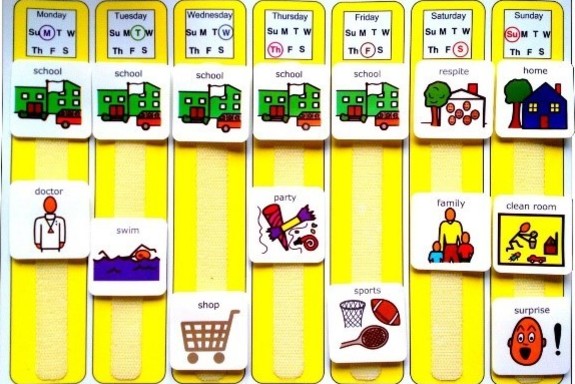Parents Summer Survival Guide
Posted on 26th August 2019 at 16:15
I help parents who are caring for children and young people with special needs or disability.
How do you manage the new routine in the summer holidays?
We all like to have an idea of what is going to happen in our day. Children with autism miss most of the language and social/behavioural cues that help the rest of us understand what is happening.
Autistic children can also become anxious, resistant and may misbehave simply because they have no way to anticipate the events that come upon them each day.
Visual schedules quickly inform the child about the day's expectations in the long summer holidays.
The advantages of using printable visual schedules for home and daily routines for children with autism are:
helps to utilise the individual’s visual strengths and therefore provides a receptive communication system to increase understanding
helps the individual to learn new things and broaden their interests
provides tools that allow the individual to use skills in a variety of settings
predictability can help the individual remain calm and reduces inappropriate behaviours
the child can develop independence and resulting self-esteem.
Some children with autism very obviously have difficulty with receptive and expressive language.
It is clear to us that these children need visual supports as a supplement to verbal communication.
Other autistic children appear to have good or even excellent receptive and expressive language skills.
However, even apparently capable children with autism can have difficulties understanding language for the following reasons:
The child may have slow processing time, which interferes with his ability to really "take in" verbal instructions. Much of what is said may be missed.
Children with autism may often he is dealing with sensory malfunctioning; the sensory system may be either over or under-functioning. Hyperfunctioning systems can make sensations almost unbearable that would otherwise be ordinary and make it almost impossible for the child to attend to what is being said. When a system is hyperfunctioning, a youngster may be preoccupied by a need to create sensation or stimulation (functioning of the sensory system can vary from day to day).
Children with autism are almost always highly stressed by their lack of understanding of the social milieu in which they must function. The child may be so overwhelmed with attempting to deal with social events and expectations, that he or she may entirely miss language-based input. (Stress can even be brought on by the experience of being physically close to other children.)
The child is least likely to process verbal information when he or she is upset, worried or angry.
Children with autism often have poor sleep patterns. Their sleep may be brief or interrupted, and they will therefore often be too tired to be attentive.
Some children with autism do not understand the pragmatics of communication. Gestures, vocal intonation, facial expressions, conversational pauses and emphases are lost on these children.
Summary to Managing Change and Transition Anxiety
Try Special Yoga stretches at home together with your child to aid relaxation for you both.
Watch TV/Movies wearing your pyjamas together.
Dance around the house to your favourite Music.
Camp out in your garden or build an indoor den using blankets, etc.
Lay down using a weighted blanket.
Use a special clock or Mobile Phone Timer to countdown end of computer time or task.
Use a Visual Schedule to display day or week ahead as discussed above
Talk about what is happening and explain in basic language using your families means of communication, e.g. Pictures, look at places visiting on the computer before you go.
If holidaying abroad, most UK airports now provide a ‘Sunflower’ lanyard for the child to carry and also have staff who can help offer special assistance to your family if needed. If you are wearing the lanyard, staff should recognise it and understand that you have a hidden disability and that you may need a little extra help or time.

Allow your child to come up with their own stress solutions. Use of objects, favourite toys, photo’s, Makaton signs, PECS symbols, drawings, taking a set of cards out with the child, etc.
Match your child’s enjoyment and passion with your activities, e.g. my son loves trees, so he likes to visit Forest areas where he is so relaxed and calm and happy.
If your child loves computers then use their tablet for enjoyment and learning or as a reward for visiting somewhere they were anxious about.
Finally... looking after yourself is so important. Self-Care really boosts our own mental health and self-esteem.
Ask yourself: What can you do for yourself, this summer?
When we take time to care for ourselves, we can:
1. Lower stress levels
2. Teach our children to value their health and wellbeing
3. Be better, healthier, calmer parents
Parenting can be tough. It’s okay to ask for help. Phone me anytime on 07412 651 894 for a chat.
Share this post:






